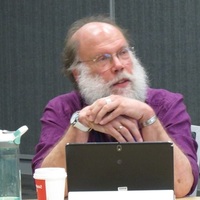Michael Muller
IBM Research, Social Software Research, Department Member
We present an ethnographic study in which we examine the ways collaborative knowledge work gets done in a process-oriented environment. The purpose of the study is to identify the kinds of support that knowledge workers could benefit from... more
We present an ethnographic study in which we examine the ways collaborative knowledge work gets done in a process-oriented environment. The purpose of the study is to identify the kinds of support that knowledge workers could benefit from and to make recommendations for ...
Research Interests:
The introduction of a social networking site inside of a large enterprise enables a new method of communication between colleagues, encouraging both personal and professional sharing inside the protected walls of a company intranet. Our... more
The introduction of a social networking site inside of a large enterprise enables a new method of communication between colleagues, encouraging both personal and professional sharing inside the protected walls of a company intranet. Our analysis of user behavior and interviews presents the case that professionals use internal social networking to build stronger bonds with their weak ties and to reach out to employees they do not know. Their motivations in doing this include connecting on a personal level with coworkers, ...
Research Interests:
Research Interests:
Research Interests:
This chapter surveys methods, techniques, and practices in Participatory Design (PD) that can lead to hybrid experiences – that is, practices that take place neither in the users’ domain, nor in the technology developers’ domain, but in... more
This chapter surveys methods, techniques, and practices in Participatory Design (PD) that can lead to hybrid experiences – that is, practices that take place neither in the users’ domain, nor in the technology developers’ domain, but in an “in-between” region that shares attributes of both spaces. Recent work in cultural theory claims that this “in-between” region, or “third space,” is a fertile environment in which participants can combine diverse knowledges into new insights and plans for action. This can include articulating, clarifying, and informing the needs of themselves as individuals, and of the people they are connected to or responsible for – e.g., depending on who the user is, their organizations, institutions, products, and services, or their classmates, playmates, families, and schools, or other people with similar situations, circumstances, challenges, or who face similar kinds of social stigma. Important attributes of third space experiences include challenging assumptions, learning reciprocally, and creating new ideas, which emerge through negotiation and co-creation of identities, working languages, understandings, and relationships, and polyvocal (many-voiced) discussions across and through differences. The chapter focuses on participatory practices that share these attributes, including: site-selection of PD work; workshops; story-collecting and story-telling through text, photography, and drama; games for analysis and design; and the co-creation of descriptive and functional prototypes.
